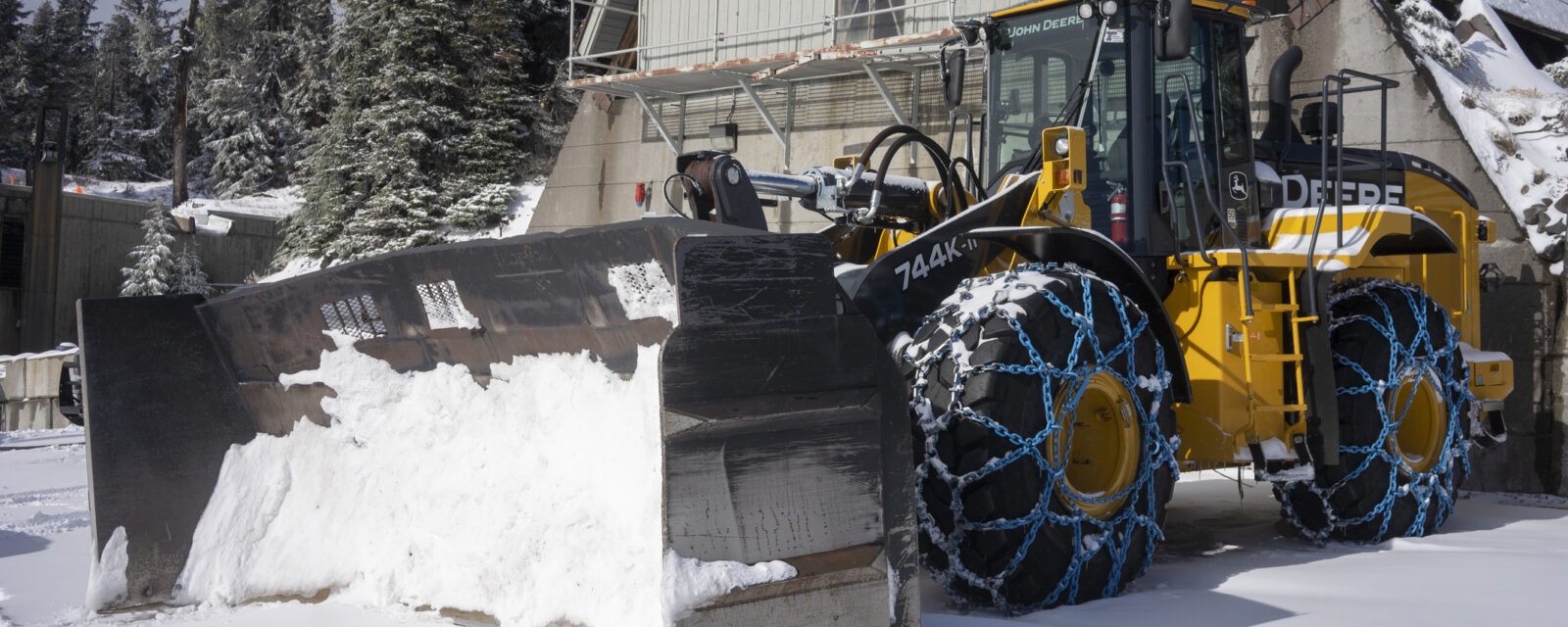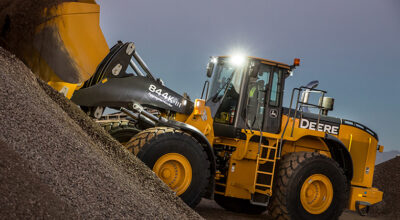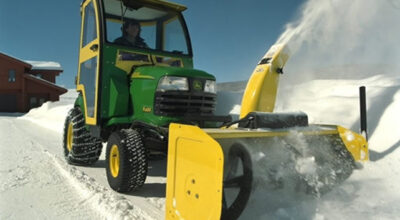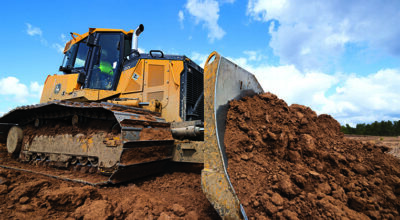Winter is right around the corner, and for construction professionals, that means it’s time to prepare your heavy equipment. Without the right precautions, the cold season can damage equipment, compromising safety, creating performance issues, and shortening equipment lifespans. To prevent these problems and ensure your machinery is in top condition for the spring, be sure to follow proven winter maintenance tips.
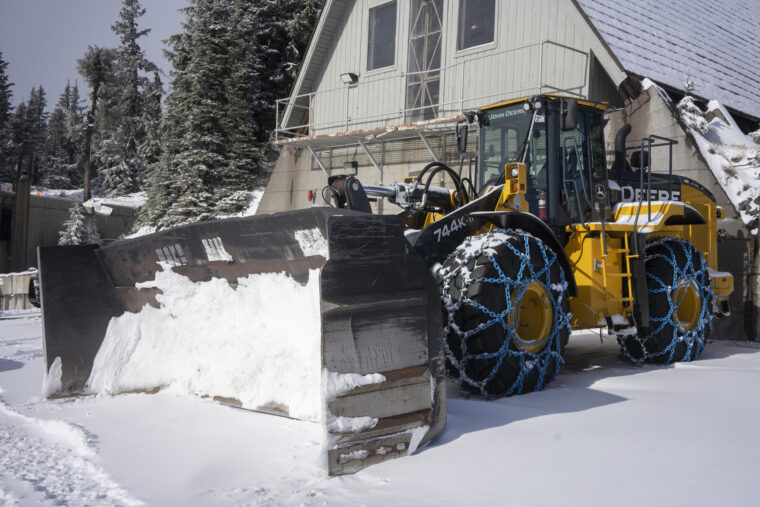
The Importance of Construction Equipment Maintenance in Winter
Construction equipment maintenance is a year-round endeavor, but it becomes especially crucial during the winter months. Harsh weather accelerates equipment deterioration and negatively impacts performance, costing you time and money.
For example, fluids can thicken, parts can rust, and batteries can lose their charge more quickly, ultimately resulting in downtime and lost productivity. In addition to worse equipment performance, operating conditions can become more hazardous and create a higher risk for accidents and injuries.
Proactive maintenance can counteract these effects. Well-maintained construction equipment is safer to operate and needs fewer costly repairs and replacements. This approach helps extend the lifespan of your equipment, ensure the safety of your workers, and enhance the efficiency of your operations.
10 Construction Equipment Maintenance Tips During Cold Weather
To successfully navigate cold weather construction and preserve your heavy machinery, consider adopting the following winter maintenance tips:
1. Store Equipment in a Sheltered Area
Exposure to snow, harsh wind, or hail can lead to frost damage, corrosion, and decreased performance. To prevent weather exposure, store your construction equipment in a covered area, such as a garage or enclosed storage space.
2. Use Block Heaters or Engine Blankets
Extreme cold causes engine components to contract and become less efficient. By investing in engine block heaters or engine blankets, you can maintain optimal temperatures and prevent cold starts that can cause long-term equipment damage.
3. Keep Fuel Tanks Full and Use Winter-grade Fuel
Over time, cold weather causes condensation to accumulate inside the fuel tank, leading to engine freezing. Keeping the fuel tank full will give condensation less room to form. Additionally, winter-grade fuel is specifically designed to withstand cold temperatures and prevent the engine from freezing.
4. Inspect and Replace Worn-out Belts and Hoses
Cold temperatures can cause belts and hoses to become more brittle and crack more easily. Worn-out belts and hoses can lead to unexpected failures and breakdowns. During the winter, regularly inspect these components for signs of wear and tear and replace any damaged components promptly.
5. Check and Replace Filters Regularly
When construction equipment is used in snow, ice, mud, or other harsh conditions, filters can become clogged more quickly. This can lead to restricted airflow, which can overheat components and cause performance issues or failure. Be sure to check your filters for cracks, tears, and holes and replace them as recommended by the manufacturer or whenever you see damage.
6. Lubricate All Moving Parts
In addition to bad weather conditions placing additional stress on the machinery and its components, winter often sees roads treated with salt and various chemicals. These substances can lead to accelerated corrosion of metal parts. Regular application of winter-grade lubrication plays a crucial role in reducing friction and preventing corrosion, ensuring smooth operations even in challenging conditions.
7. Test and Maintain Batteries
Cold weather slows down the chemical reactions in batteries, which can reduce battery capacity by up to 30%. To prevent your equipment from failing to start on a busy day, regularly test and recharge your batteries. If you won’t be using your equipment during the winter, disconnect and store the batteries in a warm place.
8. Use Proper Winter Tires or Chains
Winter tires have a tread design that is specifically designed for traction on snow and ice, while tire chains offer a temporary fix to give regular tires more grip. Both solutions can improve safety when driving in difficult conditions. If you operate in an area with severe winters or need to frequently navigate snow and ice, then winter tires are a good investment. But if you only occasionally need to operate in snow and ice, then tire chains may be the better option.
9. Clear Snow from Equipment Before Operation
Snow and ice can cause a range of issues — from adding weight that drags equipment to obscuring the operator’s view to blocking air vents and causing overheating. By clearing snow and ice before operating, you can prevent equipment damage and accidents. A broom, shovel, or de-icer are all good snow removal options, but pay special attention not to damage critical or electrical components while using these or any tools.
10. Regularly Inspect and Clean Hydraulic Systems
In cold weather, hydraulic fluid can thicken, making it more difficult for it to flow through the system. This can lead to several problems, including system overheating, slugging performance, and in extreme cases, equipment failure. As a result, you should regularly inspect and clean hydraulic components to prevent clogs.
Commonly Asked Questions About Construction Equipment Maintenance
How Can Cold Weather Affect the Performance of Construction Equipment?
Cold weather can negatively impact construction equipment in several ways. Low temperatures and exposure to snow place extra stress on components, shortening the equipment’s lifespan. Fluids thicken, parts corrode, and electrical batteries drain more quickly, potentially leading to slower operations, engine damage, or even system failure.
Should Construction Equipment Be Stored Indoors During Cold Weather?
Ideally, construction equipment should be stored indoors during the winter to protect it from the harsh elements. However, not all construction sites have access to indoor storage facilities. In such cases, it’s essential to take extra precautions, such as using engine block heaters, winter-grade fuel, and proper insulation, to minimize the impact of cold weather on your equipment.
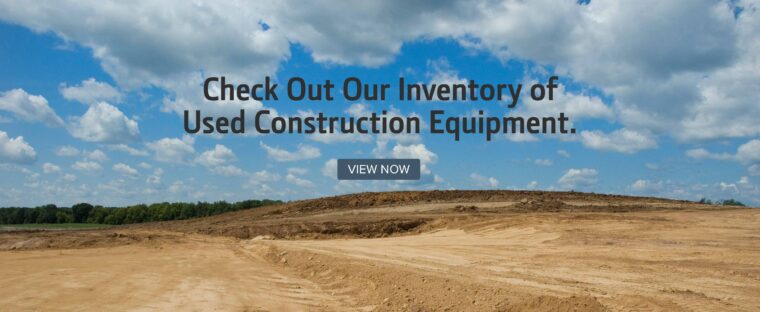
Maintain Your Construction Equipment’s Performance During Winter
As winter approaches, don’t underestimate the importance of preventive maintenance for your construction equipment. Remember, a well-maintained fleet is not only more reliable but also more cost-effective.
To learn more about how cold weather affects your John Deere construction equipment, consult your operating manual or visit your local dealer. Your dealer can help you find the right winter-grade accessories and get your fleet ready for the cold season. To find your nearest John Deere dealer, check out the John Deere locator.
If you enjoyed this post or want to read others, feel free to connect with us on Facebook, Pinterest, Twitter, or Instagram!
